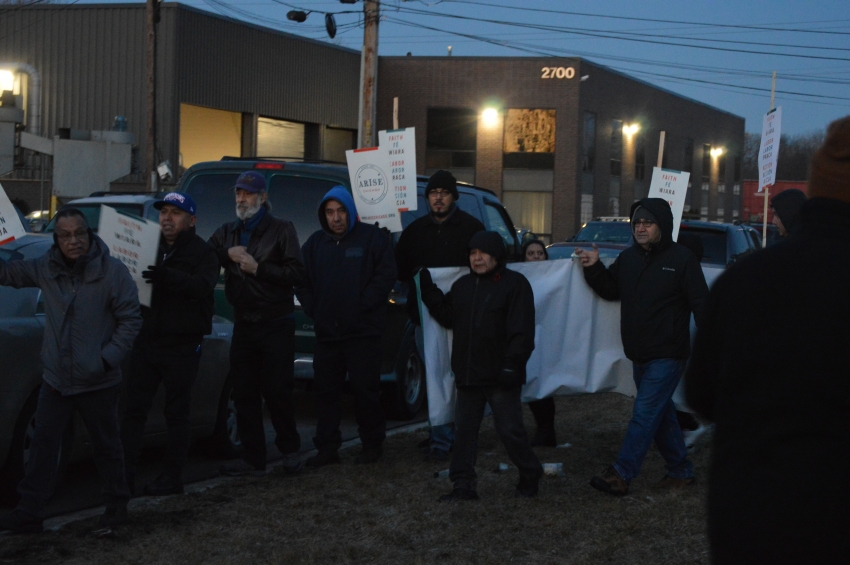
Did you know that Truthout is a nonprofit and independently funded by readers like you? If you value what we do, please support our work with a donation.
As the sun was still rising last Friday morning, employees from Headly Manufacturing outside of Chicago participated in a 6:00 a.m. hour-long unfair labor practice strike. But when the approximately 25 workers tried to return to their jobs, they were locked out of the building, unable to complete what was many of their last days or collect their final paychecks.
According to a press release from the workers’ justice organization Arise Chicago, Headly had threatened individual employees that they would be fired, which inspired them to take collective action.
“We strike for ourselves because we don’t have anything to support our families, because we need our jobs to put food on the table,” striking worker Mario Albor told In These Times. “Right now, we don’t have jobs. We don’t know what to do.”
For seven years, Albor has worked for the Broadview-based Headly Manufacturing, which produces precision-drawn metal stamps. He said he was laid off with many of his co-workers with no written explanation. Headly did not return phone and email requests for comment from In These Times.
Albor, who says he worked for the quality-control department, assumes Headly wants to rehire staffers without benefits like insurance and vacation that employees currently receive. Crain’s Chicago Business reported that recent job postings include slightly higher wages with fewer benefits.
The workers aren’t unionized, but they are supported by Arise Chicago. They marked their strike with a large Arise Chicago banner stating, “Worker Rights = Immigrant Rights = Human Rights.”
“There was a lot of confusion going around, and the workers were scared that today was going to be their last day,” Shelly Ruzicka, communications director for Arise Chicago, told In These Times. She added, “The reason they did this together was so that it would be protected ‘concerted activity,’ trying to save their jobs saying that this supposed announcement of firing was unjust firing.”
After the shock of sudden unemployment, Albor said it felt good to fight for justice collectively. During the demonstration, Headly called the police, which delayed strikers’ ability to access their workplace, according to Albor. Albor said that when the police allowed them to make an unconditional return to work, they were locked out, a common practice in labor disputes. Co-director of the National Legal Advocacy Network Chris Williams, who is serving as the workers’ legal representative, corroborated Albor’s version of events.
“It’s frustrating because we want answers,” Albor said. “And they’re not willing to give us any answers or speak with us and they closed the door.”
Williams filed a complaint with the National Labor Relations Board (NLRB), arguing that the workers’ non-economic strike about discrimination and unfair treatment is protected under the National Labor Relations Act (NLRA), the law governing private sector employees’ collective bargaining rights. He said this situation is a “pretty clear-cut violation” of NLRA Section 8(a)(1) prohibiting interference with the right to organize and Section 8(a)(3) concerning adverse actions like a lockout. He said it usually takes a few weeks to hear back from the NLRB about interviewing affected workers, but he is optimistic based on existing precedent.
“The Fight for $15 regularly holds short-term strikes on non-economic issues and [strikers] go back to work unconditionally,” he said. “The employer is not allowed to terminate people on that basis and they did in this case.”
While Albor hopes to get his job at Headly back, he’s already thinking about his future and the struggle to find a position with a similar salary and benefits. He and his wife had a baby four months ago and they own a home with a mortgage.
“They could at least pay us some money so we can support ourselves in the meantime until we find a new job,” he said. “Right now, we don’t have money because they didn’t give us our last paycheck and we still got to pay rent because bills won’t wait.”
It’s a sentiment echoed by many striking Headly employees, some of whom have been with the company for over 20 years. Quoted in the Arise Chicago press release, worker Genaro Garcia said, “We have families to feed, and if we’re fired, now we’ll be short on funds and unable to support our families. We are demanding that the company keep us employed or minimally give us more notice in order to be able to look for new jobs. It’s not easy to find work.”
With both the University of Illinois at Chicago graduate workers and the Chicago Symphony Orchestra on strike, Ruzicka of Arise Chicago is hopeful about the power of organized labor. “When workers take bold action, you can win,” she said. “We like to say when you strike, you win.”
She said an important lesson of Friday’s strike is even without the backing of a union, employees can still work together to advance their rights.
“We know a majority of workers in this country don’t have a union,” she said. “It’s very important that workers know even if you don’t have a union you can still take collective action and you are protected. Better yet, organize and get union.”
Press freedom is under attack
As Trump cracks down on political speech, independent media is increasingly necessary.
Truthout produces reporting you won’t see in the mainstream: journalism from the frontlines of global conflict, interviews with grassroots movement leaders, high-quality legal analysis and more.
Our work is possible thanks to reader support. Help Truthout catalyze change and social justice — make a tax-deductible monthly or one-time donation today.